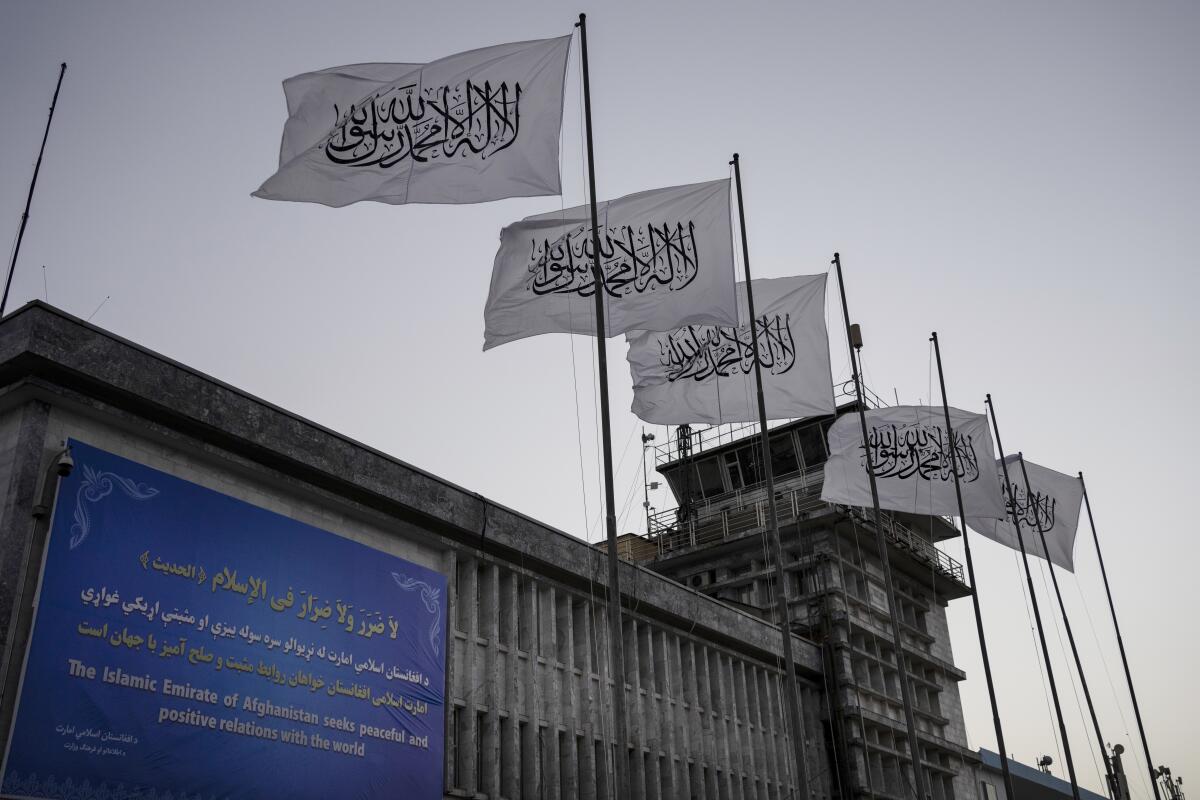Afghan women traveling alone boarding flights despite ban

- Share via
ISLAMABAD, Pakistan — Afghan women unaccompanied by a male guardian have been allowed to board aircraft in the capital of Kabul since Saturday, airport officials said Tuesday, despite a Taliban order banning them from flying.
There has been no official reversal of the order by the hard-liners in the Taliban leadership, who have been crafting increasingly repressive edicts.
A senior airport official told the Associated Press on Tuesday that it is business as usual for women traveling alone, a sign that at least some of the orders coming from a conflicted Taliban leadership are being ignored.
The official spoke on condition of anonymity because he was not authorized to speak to the media and he feared retaliation from the Taliban leadership. A second senior Taliban official also confirmed that the order was being ignored. That official also spoke on condition of anonymity for the same reasons.
In a separate show of dissent from within the Taliban ranks, police official Gen. Mobin Khan criticized a new order from the Ministry of Vice and Virtue ordering all government workers to have beards and wear the traditional turban. Beards are seen as a sign of piety.
Khan tweeted that it is a “strange system” that effectively shuts down a police or government department for three months until its officers can grow beards.
The edict demanding the wearing of beards and turbans was just the latest in a flurry of repressive edicts that followed a three-day meeting more than a week ago of Taliban leaders in their southern heartland of Kandahar.
The edicts have taken many Afghans and a wary international community by surprise as hard-liners appear to be pushing for dominance.
Since sweeping into power in August, the Taliban has struggled to transition from war to governing as its nation suffers a devastating humanitarian crisis and an economy that is in free fall. Taliban officials and other Afghans familiar with the government leadership say there are deep divisions about the way to govern Afghanistan.
Hard-liners, led by movement leader Haibatullah Akhunzada, would seem to want to return to the harsh rule of the late 1990s. But the more pragmatic among them — including many from the younger generation of Taliban officials — see the need to engage with the world. That group sees women and girls in schools and in the workplace as still being in line with their interpretation of Islam.
Akhunzada reportedly was the one to veto a return to school last week of girls beyond the sixth grade, shocking the world and many Afghans. It was not immediately clear how these repressive moves will impact a virtual donor summit being co-hosted by Britain this week, where the United Nations is seeking $4.4 billion to provide humanitarian aid to Afghanistan.
Among the regressive edicts that emerged following the Kandahar meeting was a ban on women traveling alone on both domestic and international flights and restricting women to public parks on separate days from men. While stopping short of ordering women to wear the all-encompassing burqa, orders over loudspeakers warned women on the streets against showing their hair and telling them to wear large, heavy shawls.
On Monday, officials from the notoriously strict Vice and Virtue Ministry sat outside government ministries ordering men who had no beards to go home.
Khan, the police official, tweeted that the ministry would do better to win over people’s hearts and minds and find jobs for the unemployed.
“Recognize the priorities and feed the thousands of people standing in front of the bakeries in Kabul” seeking free food, Khan tweeted.
The U.N. estimates that 95% of Afghans are not getting enough to eat and that rises to 100% in households headed by families. The World Food Program has said that Afghanistan has the highest number of women-only households, the result of more than four decades of war.
“The nation has suffered a lot have mercy on them,” Khan tweeted.
Associated Press writer Rahim Faiez in Islamabad contributed to this report.
More to Read
Sign up for Essential California
The most important California stories and recommendations in your inbox every morning.
You may occasionally receive promotional content from the Los Angeles Times.










